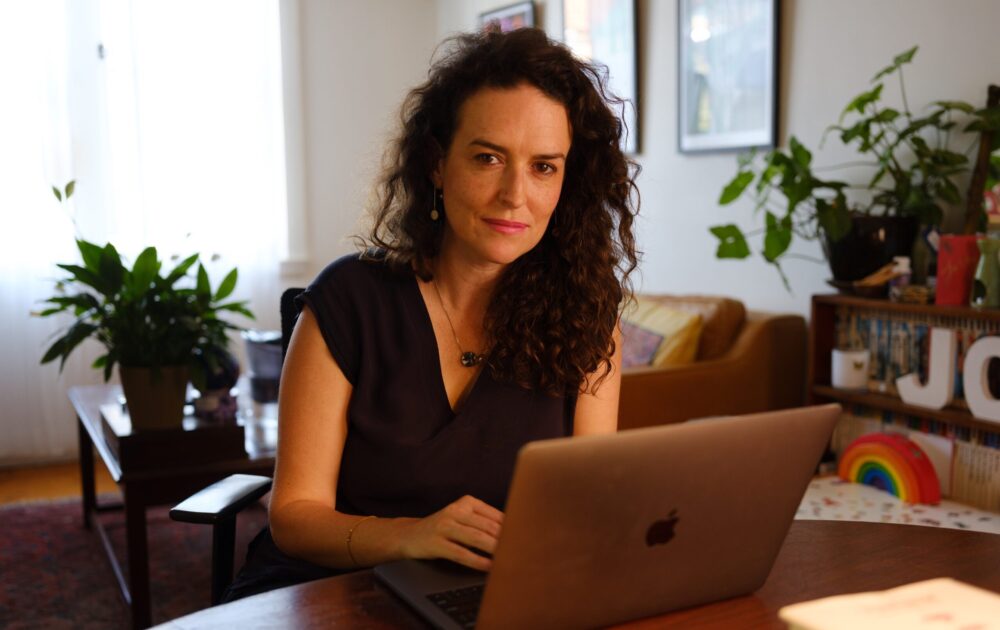The #MeToo movement has powered an insurgency against sexism and sexual violence in Australia. From once-isolated survivors to political staffers, women everywhere are refusing to keep men’s secrets.
In an electrifying Quarterly Essay, journalist and author Jess Hill traces the conditions that gave birth to #MeToo and tells the stories of women who – often at great personal cost – found themselves at the centre of this movement.
Jess recently joined Virginia Haussegger, Founder of the 50/50 by 2030 Foundation, “In Conversation” live at the ANU to talk about this work.
The “weather event”
The Australian #MeToo movement may only be five years old, but the build-up to it was decades in the making.
In her hard-hitting Quarterly Essay, journalist and author, Jess Hill deftly traces the confluence of events in recent history that led to the seismic shift in how we talk about sexual violence.
From Anita Hill’s sexual harassment allegations against the U.S. Supreme Court nominee Clarence Thomas in 1991, the Boston Globe’s “Spotlight” child sexual abuse investigations, the child abuse allegations against Rolf Harris in 2013, Elliot Rodger’s Isla Vista killings and Rosie Batty being named Australian of the Year in 2015 – the list of sordid tragedies is longer than anyone cares to imagine. And it begs the question: why now? What was different in 2017 than in all those years before?

In her Quarterly Essay, Jess Hill traces the conditions that gave birth to #MeToo.
Jess Hill refers to this as the “weather event”.
“Sometimes with these types of cultural phenomenon, we tend to think in terms of linear progress, when in fact, actually what’s happening is multiple feedback loops.”
“What I was trying to understand is: What is it that fundamentally lodged in the public mind that was not lodged there before? And how was our public mind ready to hear that?”
Since the global social media traction in 2017, the #MeToo movement has spawned thousands of articles, events, scholarly investigations – and of course, legal action – a fact that did not escape Ms Hill’s notice.
“When I first got invited to write this essay, I thought to myself, ‘What more there is to say that we don’t already know? … It’s been written about so much, what am I even going to add?’”
“Partly what I decided to do with this essay was to go, ‘Let’s just like take it from the beginning.’ In four years, a lot of preconceptions can build up. So, let’s like try to take apart those preconceptions [and] get them back to their original components and analyse them. Is what we think about the #MeToo movement accurate?
“What’s amazing about writing this essay is realising what a different culture we live in to the one we lived in in 2017, when sexual harassment was barely ever talked about…when it was presumed… that sort of stuff just doesn’t happen here [compared to the US].”
“But the progress that we are making year on year…is quite seismic.”
The cultural shift
Jess Hill’s essay starts with the moment when, in the wake of Brittany Higgins’ rape allegations, Prime Minister Scott Morrison’s is holding a press conference supposedly showing the world he cares for and understands women.
He tells the press pack that violence and abuse of women “must be acknowledge and it must be stopped”.
Just moments later, however, in response to a Sky News reporter’s question, he changes tact and warns those in the room that people in “glass houses shouldn’t throw stones”. He goes on to erroneously claim that there has been a harassment complaint inside News Corp about a specific journalist.
“The prime minister is not just making a veiled threat to the gathered reporters…he is sending a chilling coded message to one woman in the room: the journalist who broke the story of Brittany Higgins being allegedly raped in parliament house, News Corp’s political editor, Samantha Maiden,” Ms Hill writes.
In front of the ANU crowd, Virginia asks her what this says about the Prime Minister.

Jess Hill with Virginia Hausseger. Picture: Mary Kenny
“That he is a machine,” she replies without hesitation. “He’s just all about utility. Like, ‘What will keep me in a position of power?’”
At its heart, #MeToo is all about the power. The Harvey Weinstein allegations had laid bare the sinister reality of the patriarchal structures of the workplaces around the world. As Hill writes in her essay:
“This was a rare moment of structural weakness in patriarchy: a vulnerable piece of flesh had been exposed, and it was as though women all over the world received a subliminal message that now was the time to draw back their arrows and shoot.”
Speaking to Ms Haussegger, Hill draws links to the increasing media attention to child sexual abuse in the church: “This is starting to lay the groundwork to overturn…a presumption that people in power, particularly men in power, would never do what we consider to be depraved behaviour.
“There was a whole institution of silence and cover up that permitted them to go on and do it again and again.”
Reflecting on the many #MeToo stories that resulted in the victim getting attacked in popular discourse – including that of Tessa Sullivan – Ms Hill critiques Australia’s culture of mates protecting mates.
“Don’t let the law get in the way. Don’t let those bitches get in the way. You know, you’ve got to step in for your mates, it doesn’t matter what they’ve done.”
The unfolding of #MeToo in Australia
Australian television presenter, author and horticulturist Don Burke was the first target of Australia’s #MeToo movement. The story was uncovered injoint ABC/Fairfax investigation, and detailed claims from a number of women who worked with Burke in the late 1980s and 1990s.
Quoted in the essay, lawyer Michael Bradley explains: “The textbook example of how to do it was the Don Burke one, which was really a replication of the Weinstein approach: bury him in volume, so he knows that there’s no point – he’s done. There’s a tipping point, and it’s a game of bluff, right? [By contrast, actor] Craig McLachlan took the other course: call the bluff. He went after them and sued one of the victims.”
New Corp journalists hoped to deal a similar blow against actor Geoffrey Rush, when they published allegations against him in November 2017. Instead, Rush won a defamation case against the publisher.
Michael Bradley further explains: “It was the [Geoffrey] Rush case specifically that “scared the shit out of everyone. It was just such a game-changer,” Bradley says. “If that hadn’t happened, if they’d done their homework properly . . . I know that Fairfax and ABC had a queue of stories lining up they were going to run. Everyone just ran for the exit. It stopped the whole thing dead in its tracks.”
Ms Hill is scathing about how this unfolded. She writes: “Let’s be clear: The Telegraph’s story on Rush was an epic failure of journalistic ethics – by far the most egregious example of ‘trial by media’ in Australia’s #MeToo era.”
She further explained at the ANU event: “They were just desperate, because they didn’t have a #metoo story. And it was the biggest story going.”
“They’d heard second-hand that Eryn Jean Norvill had made this complaint, but they did not go to her [for comment] and she had expressly said she did not want to go public with it.”
The Telegraph, Ms Hill says, then published front page story: “[W]e can say what we like about defamation laws, but it was very clear that what it was saying about Geoffrey Rush, and did not substantiate it.”
In her essay Hill describes this as “sloppy ‘gotcha’ journalism’. Recounting the advice of Michael Bradley to the ANU audience, she argues: “You have to prepare these stories and the people who are the victims, survivors, like they are witnesses going to trial.”
“You need to do that not just because of defamation laws, but because that’s actually what good investigative journalism does.”
“There’s a real question mark around whether Australia’s defamation laws would have crushed the #MeToo movement, had it not been for this catastrophic error that News Limited made.”
“Anyone who has allegations against them…when you launch a defamation case, all of that evidence is going to be brought to bear. Do you want that? And they know how many potential accusers there are. So, it’s a game of bluff.”
- With editing and editorial help from Dr Pia Rowe. Read more of her work here.
Feature image: Supplied.
Ginger Gorman is a fearless and multi award-winning social justice journalist and feminist. Ginger’s bestselling book, Troll Hunting,came out in 2019. Since then, she’s been in demand both nationally and globally as an expert on cyberhate and the real-life harm predator trolling can do. She's also the editor of BroadAgenda and gender editor at HerCanberra. Ginger hosts the popular "Seriously Social" podcast for the Academy of the Social Sciences in Australia. Follow her on Twitter.





